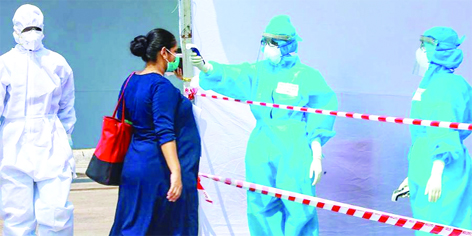Dr Vanita Mahajan
COVID-19 is the biggest global event-and challenge-of our lifetimes. As such, it is changing human attitudes and behaviours today and forcing organizations to respond. According to the World Health organization, the problem does not lie in COVID-19 alone but rather in the fear, panic and terror caused by the spread of the virus, and amplified by the media, which has been presenting the situation as if it were the end of the world. The current crisis is not of the pandemic alone. Rather, it is of the far reaching consequences on human behaviour. Addressing these repercussions should not be limited to taking ad hoc costly measures limited to the current situation but should prompt us to think about putting into place innovative measures and actions that go beyond the pandemic.
Given the complex risks and perceptions associated with an influenza pandemic, communication strategies that simply disseminate outbreak information and recommendations will be insufficient. The scope and complexity of the task demands frequent, transparent, and proactive communication and information exchange with the public, partners, and other stakeholders about decision making, health recommendations and related information. The goal of planning and coordination efforts is to provide leadership and coordination across sectors. One important aspect is to integrate pandemic preparedness into national emergency preparedness frameworks. Reducing the spread of disease will depend significantly upon increasing the “social distance” between people. Measures such as individual / household level measures, societal level measures and international travel measures and the use of anti virals, other pharmaceuticals and vaccines will be important. Individual / household level measures include risk communication, individual hygiene and personal protection and home care of the ill and quarantine of contacts. Societal level measures are applied to societies or communities rather than individuals or families. These measures require a behavioural change in the population, multiple sector involvement, mobilization of resources, strong communication and media support
International human rights law guarantees everyone the right to the highest attainable standard of health and obligates governments to take steps to prevent threats to public health and to provide medical care to those who need it. Human rights law also recognizes that in the context of serious public health threats and public emergencies, threatening the life of the nation, restrictions on some rights can be justified when they have a legal basis, are strictly necessary, based on scientific evidence and neither arbitrary nor discriminatory in application, of limited duration, respectful of human dignity, subject to review, and proportionate to achieve the objective. In this time of crisis, thousands of papers and guidelines have already been published about COVID-19. Most of these consider the important questions of how to respond to the ongoing public health crisis, or how to mitigate the impacts of the pandemic.
A number of ethical issues are raised by a potential influenza pandemic. Ethical concerns associated with the planning, preparedness and responses to future pandemics are important to consider, ensuring that response efforts are not hindered in the event of a pandemic.
These include:
* priority of access to healthcare resources with increased demand and possible shortages;
* obligations of helthcare workers in light of risks to their own health; and
* the fine balance between reducing disease spread through isolation and travel measures whilst protecting the right of individuals to freedom of movement.
Efforts hereby need to be made to explore lessons learned from past pandemics, identify barriers to equitable and effective responses to future pandemics and examine opportunities to overcome these obstacles through research, policy, legislation, communication and community engagement.
However, the COVID-19 pandemic has had the power to shift everyone’s psychological needs and drivers. During the pandemic, the anxiety has changed many important values for huge numbers of us. The COVID-19 crisis has aggravated the vulnerability of the least protected in society. It has highlighted deep economic and socil inequalities and inadequate health and social protection systems that require urgent attention as part of the public health response throughout the globe. Women and men, children, youth and older persons, refugees and migrants, the poor, people with disabilities, persons in detention, minorities, among others, are all being affected differently in developed, developing and underdeveloped countries. State has an obligation to ensure everyone is protected and included in the response to this crisis. This is not a time to neglect human rights, it is a time when, more than ever human rights are needed to navigate the crisis in a way that will allow us, as soon as possible, to focus again on achieving equitable sustainable development and sustaining peace. Measures need to be taken to mitigate any such unintended consequences. Observing the crisis, and its impact through a human rights lens puts focus on how it is affecting people on the ground, particularly the most vulnerable among us, and what can be done about it now, and in the long term.
Presently, COVID-19 pandemic has become a fear psychosis in the society and has created a sort of panic as well so much so that it has emerged as a social stigma. Its better that people understand it as a viral outbreak understand its implications, maintain reasonable distancing and sanitation and especially keep elderly persons and the one with any co morbidity as much protected as possible. And public should focus on boosting the immune system of the body through all possible ways.
(The author is Lecturer in Education Deptt)
feedbackexcelsior@gmail.com


